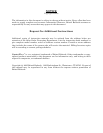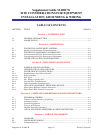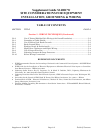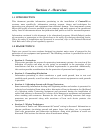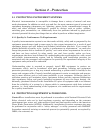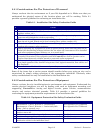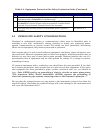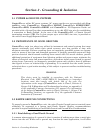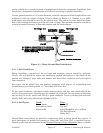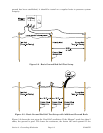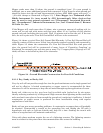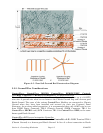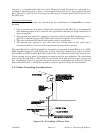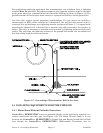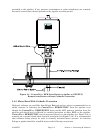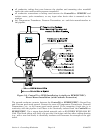
S1400CW Page 3-2 Section 3 - Grounding & Isolation
not be suitable for a complex system of sophisticated electronic equipment. Conditions such
as soil type, composition and moisture will all have a bearing on ground reliability.
A basic ground consists of a 3/4-inch diameter rod with a minimum 8-foot length driven into
conductive earth to a depth of about 7-feet as shown in Figure 3-1. Number 3 or 4 AWG
solid copper wire should be used for the ground wire. The end of the wire should be clean,
free of any coating and fastened to the rod with a clamp. This ground connection should be
covered or coated to protect it from the weather and the environment.
Figure 3-1 - Basic Ground Rod Installation
3.3.1.1 Soil Conditions
Before installing a ground rod, the soil type and moisture content should be analyzed.
Ideally, the soil should be moist and moderately packed throughout to the depth of the
ground rod. However, some soils will exhibit less than ideal conditions and will require
extra attention.
Soil types can be placed into two general categories with respect to establishing and
maintaining a good earth ground, i.e., ‘Good Soil’ and ‘Poor Soil.’
To be a good conductor, soil must contain some moisture and free ions (from salts in the
soil). In very rainy areas, the salts may be washed out of the soil. In very sandy or arid area
the soil may be to dry and/or salt free to a good conductor. If salt is lacking add rock salt
(NaCl); if the soil is dry add calcium chloride (CaCl
2
).
3.3.1.2 Soil Types: Good
Poor
Damp Loam Back Fill
Salty Soil or Sand Dry Soil
Farm Land Sand Washed by a Lot of Rain
Dry Sand (Desert)
Rocky Soil
Ground Beds must always be tested for conductivity prior to being placed into service. A
brief description of ground bed testing in ‘Good Soil’ and ‘Poor Soil’ is provided herein.
Details on this test are described in the National Electrical Code Handbook
. Once a reliable



